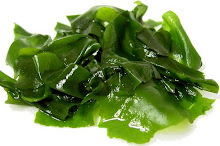

images from algaebase.org & http://www.bichel.dk & http://z.about.com/
Kombu (COME-boo) is a long brown and thick sea vegetable from the kelp family (genus Laminaria). It is an important ingredient in Japanese, Chinese and Korean cultures and an essential ingredient of dashi, a flavorful stock.
Aliases: konbu, dashima, laminaria
Growing habitat: It is found on almost every coast. All parts of the plant are used and the broad leaves grow up to thirty-three feet in length! Kombu is usually harvested in the summer with long hooked poles and dried in the sun.
Nutrition: rich in protein, calcium, iodine, magnesium, iron and folate. kombu also provides healing and soothing mucilages that coat the lower digestion tract relieving peri-anal inflammation, colitis, and constipation.
History: Kombu has been used in Japan dating back to the Jōmon period (from 14,000 BC to 400 BC). In the 1960's kombu arrived in the U.S. due to the influence of the macrobiotic diet. Currently in Japan, special boutiques sell nothing but kombu and kombu products, of which there are more than 300!
Uses: Kombu is very mild in flavor and can be added to soups, cooked with beans (helps tenderize them + add nutrients+ speed cooking time + make more digestible), eaten raw, pickled, crumbled up and used as a seasoning,
Preparation: Wash dried kombu under running water to eliminate any sand or extra salt (optional). Dried kombu needs to be simmered for at least 20 minutes to soften it and flavor the liquid. If used only for flavoring stock, the kombu itself is removed from the simmer liquid at the end of cooking and discarded.
Recipes:
Kombu Dashi (Traditional Japanese Soup Stock)
Sweet Wakame and Ginger Kale Salad
Noodles & Broth
Land and Sea Vegetable Salad
(Pickled) Garlic in Kombu Soy Sauce Tsukemono
Lightly Pickled Cucumbers and Wakame Sea Vegetable


1 comment:
I'm using a vegan chili recipe that calls for kombu to cook with the beans. It helps to tenderize them and aids in digestion.
Your post about MSG is interesting too -- kombu was the original source for natural glutamic acid. So kombu is a natural flavor enhancer as well, without the side effects of artificial MSG.
Post a Comment